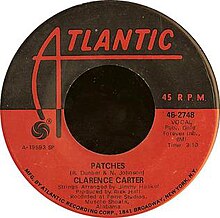Patches (Chairmen of the Board song)
| "Patches" | ||||
|---|---|---|---|---|
 |
||||
| Single by Clarence Carter | ||||
| B-side | "Say It One More Time" | |||
| Released | July 1970 | |||
| Format | 7" | |||
| Recorded | 1970 | |||
| Genre | Soul, southern soul | |||
| Length | 3:10 | |||
| Label | Atlantic | |||
| Songwriter(s) | Ron Dunbar, General Johnson | |||
| Producer(s) | Rick Hall | |||
| Clarence Carter singles chronology | ||||
|
||||
"Patches" (sometimes known as "Patches (I'm Depending On You)") is a country soul song written by General Johnson and Ron Dunbar and best known by the 1970 hit version of Clarence Carter. It won the 1971 Grammy Award for Best Rhythm & Blues Song.
The song was written by General Johnson, the lead singer of Chairmen of the Board, with Ron Dunbar, who worked in A&R and record production at the Invictus record label, owned and overseen by Brian Holland, Lamont Dozier, and Eddie Holland, formerly of Motown. Dunbar was often credited with co-writing hit songs at Invictus with "Edyth Wayne", a pseudonym used by Holland-Dozier-Holland during the time when they were in legal dispute with Motown and its music publishing arm Jobete to which they had been contracted.
The song tells a story about how a boy born and raised in poverty in Alabama "on a farm way back up in the woods" took over responsibility for his family from his dying father. "Patches" was included on Chairmen of the Board's first album, The Chairmen of the Board (later reissued as Give Me Just a Little More Time), and was the B-side of the group's July 1970 single, "Everything's Tuesday", their third chart hit.
The blind southern soul singer Clarence Carter heard the song, later saying: "I heard it on the Chairmen of the Board LP and liked it, but I had my own ideas about how it should be sung. It was my idea to make the song sound real natural..." Initially he thought "that it would be degrading for a black man to sing a song so redolent of subjugation" but was persuaded to do so by record producer Rick Hall, who told him that it related to his own personal history as he was growing up.
...
Wikipedia
